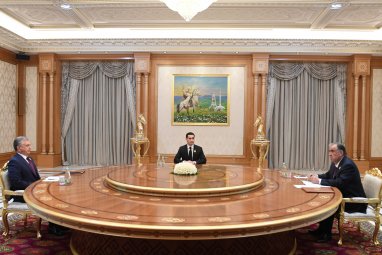What’s behind the trilateral summit of heads of states of Turkmenistan, Tajikistan, and Uzbekistan?
dialoge and frank conversations between the three can help hammer out common positions and/or responses to common challenges and threats.

By Aditi Bhaduri
The trilateral meeting between heads of state of Uzbekistan, Turkmenistan and Tajikistan today in the Turkmem capital Ashkhabad is quite significant. It once again underscores the necessity felt in the countries of Central Asia for more integration and regional Cooperation emanating from common issues, challenges, and threats.
The meeting is is expected to intensify trilateral cooperation and strategic partnership between the three countries.
Three factors can said to be at play here.
First, Russia’s military intervention in Ukraine has set alarm bells ringing in the region. Faced with the spectre of possible secessionist tendencies on their own territories, the biggest and richest of the Central Asian Republics (CARS) like Kazakhstan and Uzbekistan have refused to recognise the independence of breakaway Ukrainian provinces of Donetsk and Luhansk.
Secondly, there has been the disruption of supply chains, threatening trade, and in particular, food security, first becauseof Covid-19and then Ukraine. The Ukraine crisis has caused food insecurity with wheat scarcity. There has been a spike in food prices, shortages arising from ban on wheat and sugar exports from Russia, spiking energy prices and inflation. Food prices have shot up by about 30 per cent; in some places like in Turkmenistan there have even been violent protests against rocketing prices.
The Ukraine crisis has also severely impacted immigration to Russia and remittances back to countries like Kyrgyzstan, Tajikistan and Uzbekistan, heavily dependent on such remittances.
The third common challenge is Afghanistan which borders all these three countries, all of them threatened with the spe tre of terrorism, import of radical ideologies, and drug trafficking.
All the above factors call for regional responses, and this is what this trilateral summit is seeking to do.
Given the fact that all the three countries are landlocked furthers the urgency for regional Cooperation.
Uzbekistan, which it may not be inaccurate to say, pursues the most autonomous foreign policy in Central Asia has been at the forefront of initiatives taken for regional Cooperation and connectivity, beginning with the 2018 Consultative Meeting of the heads of state of Central Asia. It has also resolved its border conflict with Tajikistan.
Turkmenistan, which follows a policy of strategic neutrality, is also slowly opening up its economy. Hence, connectivity is of prime importance as it has an outlet to the Caspian Sea and for now forms a crucial link for Uzbekistan ‘s access to the Caspian Sea and also Iran.
Simultaneously, intensifying intra-regional trade and investments can speed up regional self-sufficiency in food security, energy security, and possibly offer a solution to the migration problems caused by the Ukraine war.
Another objective may also be to develop some kind of regional mechanism to quell domestic chaos or unrest like the kind witnessed last year in Kazakhstan, where troops from the Moscow led CSTO had to be called in. While Tajikistan is a CSTO member Turkmenistan and Uzbekistan are not.
There are of course challenges to how far such trilateral cooperation can go, at least for the near future. While Uzbekistan and Turkmenistan are resource rich Tajikistan is not and in economic terms far behind them. While Uzbekistan and Turkmenistan are also members of the Organisation of Turkic States, Tajikistan is not, being a Persianate state. Of the three countries Tajikistan is the most closely allied and dependent on Russia, also hosting the largest Russian military base. Finally, significant differences remain between Tajikistan on one hand and Uzbekistan and Turkmenistan on the other regarding Afghanistan. While both Uzbekistan and Turkmenistan de facto recognise the Taliban and engage with it, Tajikistan has refused to engage with the group.
All these factors, therefore, make the trilateral Ashkhabad summit, of greater significance as dialoge and frank conversations between the three can help hammer out common positions and/or responses to common challenges and threats.
The very fact that there has been acknowledgement and concrete proposals outlined instead of simple feel- good platitudes, demonstrate that Central Asia is on an irreversible course for further integration and delivery of regional mechanisms for dealing with regional challenges.